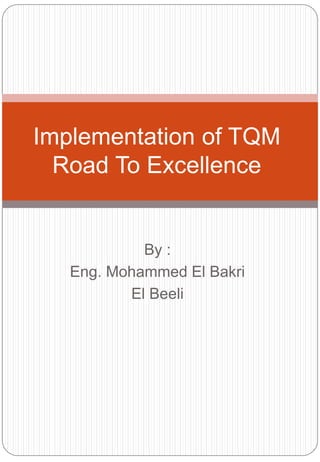6.Management By Ethics
- 1. By : Eng. Mohammed El Bakri El Beeli Implementation of TQM Road To Excellence
- 2. By: Mohammed Elbakri Elbeeli Specialist Engineer MSC IN CONSTRUCTION MANAGMENT Management By Ethics
- 3. Total Quality Management ď‚— Total quality management is a method focusing on optimization of industrial process under economic aspects. ď‚— TQM approach claims : Customer satisfaction is a central with absolute priority , and assumes that achieving customer satisfaction automatically implies optimal economic results. ď‚— TQM is structured according to the (3) levels : total, quality ,management .
- 4. Aspect : Total ď‚— All activities of a company are included in the optimization process ď‚— The development of new technologies is means of achieving customer satisfaction rather than an end in itself .
- 5. Aspect : Quality ď‚— The objective of increasing the efficiency and affectivity of the company. ď‚— Quality is a measuring device for the assessment of processes , and management techniques with respect to customer satisfaction . ď‚— The aim of quality in TQM : to establish a structure in which all persons involved in the process do their jobs in the best possible way .
- 6. Component Management  Aims to bringing the entire company in line with customer expectations .(produce goods adapted to the customer’s requirements instead of selling standardized products that do not entirely match customer needs .  On second level : management refers to the continuous restructuring of the company’s procedures by checking whether there are redundancies (blocks) .
- 7. In a wider sense  TQM strategy implies a broader view of how technology should be designed .  TQM means that technology should be shifted from a product –oriented concept to a stakeholder perspective , which sees technology within the context of supplier, producer , customer and shareholders of the company .
- 8. Ethic Quality Management Concept ď‚— Aims at enlarging the scope of TQM to involve the social implication of a company . ď‚— i.e. more or less moving from a shareholder perspective to the larger stakeholder perspective .
- 9. TQM & ETHICS The common factor between TQM and Ethics is that : An integral perspective is needed in order to achieve the intended goals . The process approach is mentioned in ISO 9001 “ necessary for an organization to function effectively , it has to identify and manage numerous linked activities “ This is also true for engineering ethics , where it is useless if one focus only on the ethical activity of individuals .
- 10. Conclusion  Engineering ethics need to be integrated throughout the engineering process and involve the decision – making parties .  Like quality issues in TQM , ethics tasks have to be fulfilled by all members of a company .  Individuals may solve conflicts as long as their responsibility , effective action level and ethical competence are sufficient to solve a given problem .  As soon as individuals are no longer able to solve conflict , they need institutional and academic support .
- 11. Continue : Conclusion Remove all disturbance to clear the road to quality excellence . Harmony of environment is very important for all people in 21 century (Kyoto agreement ) . Any who believe in God And the Last Day , And work righteousness , Shall have their reward . (Baqara 62) Local authorities has the Wright of allowance according to the customer known quality condition .
- 12. Cultural Shift : Role of middle management 1))EXPANDS ď‚— Implement suitable quality system for the organization . ď‚— Use statistical process control methods (SPC ) . ď‚— Improve interpersonal skills training programs . ď‚— Improve team building abilities ( problem solving , brain storming ) ď‚— Involve as mush as possible more new people . ď‚— Design appropriate training programs suitable for the case study organization . ď‚— Practical background knowledge are highly recommended from trainer outside trainers .
- 13. Role of middle management expands ď‚— Trainers from outside & inside best because it give good mix of diversity & practicality . ď‚— HR needs to be involved early in quality improvement teams . ď‚— Trained teams should concentrate at bottleneck problems . ď‚— Self management teams are the result of the cultural shift . ď‚— Teams are partners in selecting future team members . ď‚— By putting advice note .
- 14. Developing TQM Programs : ď‚— Make effort to integrate the approach to the instruction process . ď‚— Training objectives are directed to help all reach their goals . ď‚— Create training and development programs using job language ( har sounds ) , employees will respond better . ď‚— When reaching acceptable quality change the hr language to a more friendly one and give more details . ď‚— The organization is now ready to adopt a quality system .
Editor's Notes
- #8: In focusing on customer satisfaction , a certain change in technology management paradigms takes place , as the customer regains importance as a human being , whereas technical skills are of secondary importance . Furthermore , the total quality management philosophy also means that a company is regarded as a part of society with several interested parties , and therefore provides a starting point for the reflection of social implications of the company’s activities .













